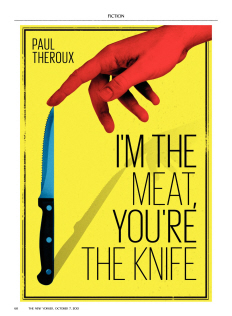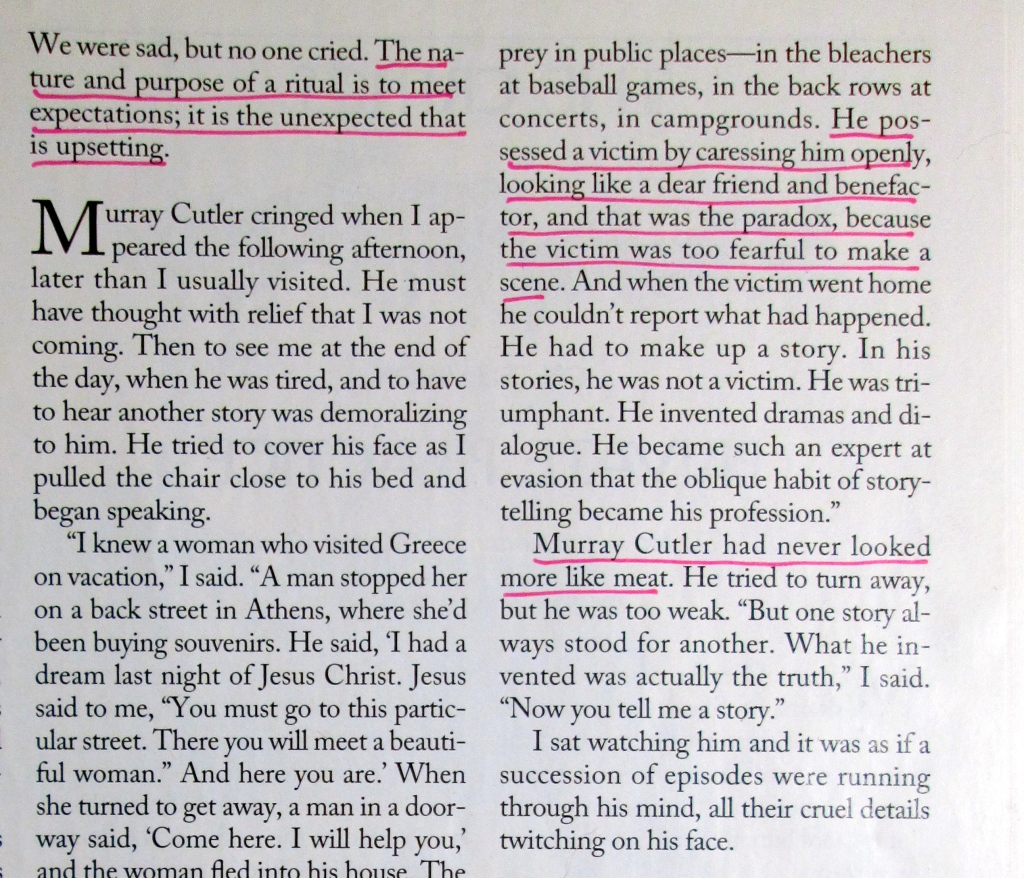As much as I love to blog and tweet, I’ve been trying to step back, to read and smell the roses. That means renewing my acquaintance with and my love of the short story. I do enjoy novels, of course, but, as a writer, my first love was the short story. In all the forty plus years I’ve been writing, the very first novel I ever wrote was in 2007. It remains unpublished and in serious need of revision.
I feel a stronger affinity with the short story. I’m attracted to the economy of language in the short story. You have to say so much with so little. I was reminded of this recently when I was perusing an issue of the New Yorker (October 7, 2013) and came across a story by Paul Theroux, “I’m the Meat, You’re the Knife.” (Note about the link: You’ll need to be a subscriber to read the story online.)
It was the third sentence that drew me in: “Sometimes bad news takes the form of a greeting.” I already knew that Murray Cutler was sick and that this was somehow meaningful to the narrator. So I read on and, since this is a short story, through to the end. Along the way, I found myself underlining sentences. In pink ink no less. I haven’t underlined in a magazine or a book in years. I used to do it all the time, especially when I was a student. But when I started to recycle my books by trying to sell them, well, no one wants to buy a used book that’s pockmarked with marginal notes, yellow highlighter and exclamation marks. But it was fun to underline the sentences that made me pause and wonder. And really fun to do it with pink ink.
Here’s what I found to be pink ink-worthy:
“But a death is not something you mention in passing to someone you run into. And it was better to keep these two dramas separate. Individually, they were tragedies; lumped together, they were merely news.”
“He had been a practical man, who believed in the economy of the plain truth, who thought that fiction was folly and only jackasses and liars made up stories.”
“The nature and purpose of a ritual is to meet expectations; it is the unexpected that is upsetting.”
“He possessed a victim by caressing him openly, looking like a dear friend and benefactor, and that was the paradox, because the victim was too fearful to make a scene.”
“Murray Cutler had never looked more like meat.”
In this story, Theroux write of a whole life, a novel’s worth of a life.
In an interview with Deborah Treisman, Theroux said, “The impulse to write comes, I think, from a desire—perhaps a need—to give imaginative life to experience, to share it with the reader, not to cover up the truth but to deliver it obliquely.” The truth in this story is delivered obliquely, but it is there and it is chilling.


20 responses to “Short Stories: Paul Theroux”
Reblogged this on Dean'z Worldz and commented:
A great post by Marie!
LikeLike
Thanks for the reblog, Dean!
LikeLike
Really nice. I too love short stories. The collection of John Cheever is one of my favorites. Thanks
LikeLike
You know, I haven’t read any of John Cheever’s stories. Sometimes I wonder how I managed to get this far in my life without having read some of these great authors.
LikeLike
John Cheever is one of my favorites, too!
Ellespeth
LikeLike
OK, I need to go to the library and check out some Cheever 🙂
LikeLike
Love short stories. They are my favorite. 🙂
LikeLike
🙂
LikeLike
It’s funny, I am not really a short story fan, however since starting to write seriously I have found myself more and more drawn to it as a medium and have managed to write a few myself. I think it boils down to the fact that I am rubbish at being economical with words, and actually, I think it is harder to write a good short story than a novel. Great post Marie.
LikeLike
Thank you, Jade. Yes, I think it is harder to write a short story. Yet, truth be told, I prefer to write them. It’s only because of NaNo that I’ve ever written novels. The fact that they are all still in first draft just reminds me that it’s a form I have difficulty with. I can definitely be verbose, but, unlike your novel (the one I’ve read that is) that has a beginning, middle, and “end” (since you are writing sequels), my novels could just go on and on and on, rather boringly, I think 🙂
LikeLike
Ha ha… yes, I suppose it could work like that. That’s why I ended up with a sequel though – it only started out as one book! LOL. 🙂
LikeLike
Oh, good point! That’s much the case with my work too 😉
LikeLike
I’m just now starting to find my love for the short story. I’m writing shorts for Nano, and I”m having so much fun, I’m not sure how well I’ll do going back to a full manuscript 😉
LikeLike
You know, I think if I continue to do November NaNos, that I might just do a series of shorts as opposed to a novel. I’m kind of getting tired of drawing a story out. Even though I’m doing well with my word count, the idea of writing 50K words for one “story” is still daunting for me.
LikeLike
Super intriguing– I’m not sure why, but I feel like I sort of missed out on short stories. I started reading compulsively at such a young age that it was always book-book-book. I do have one favorite short story (Domestic Relations by Frank O’Connor) and it has always amazed me how he was able to pack so much into so little space. I tell myself to get acquainted with short stories… perhaps I need to renew this interest!
LikeLike
Thanks for the comment and the follow, Aussa 🙂 Most short stories I’ve read have been in magazines like The New Yorker, but in school and college, it was always novels that we were assigned (not that that was a bad thing :)). I’ll have to look up Domestic Relations. Thanks for the mention of it.
LikeLike
I’ll have to dig thru the magazine pile for this issue!
Like John, I also like John Cheever. My all time favorite short story writer is Ellen Gilchrist.
Enjoy the reading!
Ellespeth
LikeLike
Thanks, Ellespeth. Yes, those issues of The New Yorker pile up, don’t they. I’m glad we hang onto them as long as we do 🙂
LikeLike
I don’t underline (also don’t like to besmirch the pages) but I often write out a beautiful sentence in my own hand to understand how it would feel to have produced it. I believe some form of osmosis will take place and my writing will improve as a result. Boy, your sentences look pretty underlined in fuchsia 🙂
LikeLike
I figure if I’m going to underline, I should use pretty ink 🙂 I’ve always been an “underliner” and margin scribbler, but I try to limit this tendency to books/magazines that I expect to keep. If I know I’m going to resell a book or donate it to the library, I try to keep it clean so the next reader can enjoy it without my thoughts getting in the way. I like your idea of writing out sentences. I’ve never tried that, but I will now 🙂
LikeLike